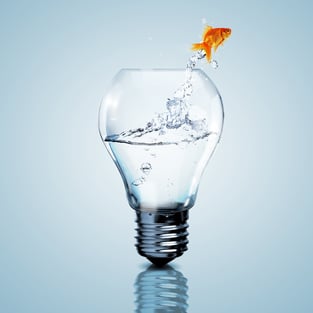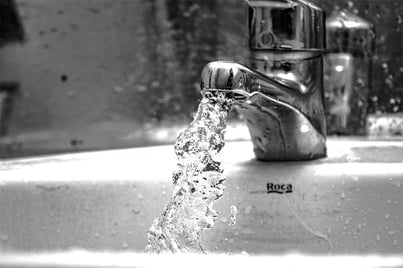
A leaky faucet, at the rate of one drop per second, wastes up to 2,700 gallons of water per year. Leaks aren't just costly from a utility standpoint. Left unchecked, they can result in significant water damage and massive repair costs.
Water waste harms both businesses and the environment. It behooves commercial and residential buildings alike to strive to improve water conservation efforts. Thankfully, technology makes eliminating water waste easier, and smart water management tools are one of the most effective solutions available.
Below is a roadmap to smart water technologies. Take a look, and discover how these innovative water solutions save thousands of gallons through automation, preventative analytics, and data-driven insights.
What Is Smart Water Management?
Smart water management incorporates a range of applications to gather real-time data concerning a building's water usage.
Building managers connect sensors to key water appliances, such as toilets, faucets, washing machines, pumps, and pipes.
These sensors act as smart water meters, analyzing appliances for water quality, flow rates, and usage. Then, through the IoT network, the data funnels into a cloud server where water managers view real-time stats.
Overall, smart water management solutions are meant to paint the most detailed picture possible of how buildings consume water.
The Role of IoT in Water Management
IoT is a core technology in smart water systems, as it powers the ability to gain holistic visibility of a building's water usage.
IoT is the network connecting a series of smart water devices, like smart faucets, to a web-powered platform. From there, managers track vital metrics for appliances across an entire building in one place.
Additionally, building managers use IoT with AI to automate processes, like auto-valve shut-offs if a leak is detected. IoT also lets managers set notifications, like routine updates on water quality or emergency alerts concerning unhealthy pH levels or increases in water pressure.
Benefits of Smart Water Systems in Sustainability Efforts
Once in place, smart water systems immediately yield a handful of benefits.
Lower Water Bills
Whether you use smart irrigation systems for massive agricultural projects or sprinkler systems for commercial properties, smart water systems discover ways to lower water bills drastically.
For example, placing sensors on key infrastructure, such as old pipes prone to leaks, can identify issues early, mitigating costs. With immediate alerts, management can directly perform rapid fixes, saving up to thousands of dollars in water waste and maintenance.
Promote Sustainability and Waste Production
Studies reveal two-thirds of the world's population suffers from water scarcity at least once a month. This startling and growing statistic means that every building and facility, regardless of location, must take measures to institute conservation techniques.
Smart systems monitor water usage holistically, allowing managers to identify trends for bolstering conservation efforts. However, smart systems also identify areas for water recycling efforts, especially by attaching sensors to massive irrigation and sprinkler systems.
Establish Continuous Improvement
Through big data, AI, and IoT, these management solutions can spot problems and predict potential issues based on historical data sets. For example, smart systems can analyze pressure changes and switch off water before an appliance overflows or pipes burst.
With deeper insights into infrastructure, building managers can establish cultures that blend tech and human insights working together to increase efficiency and savings consistently.
Key Components of a Smart Water Management System
The most effective smart water systems use three core components:
- Intelligent Appliances – digital devices capable of self-adjustments, which reduce time-consuming labor like manual monitoring and maintenance
- Smart IoT Networks – a dedicated connection for gathering data across active devices and providing a broad overview of water usage stats
- Cloud-Based Platforms – apply algorithmic processing and AI to data sets and issue automated alerts, insightful reports, and predictive maintenance
How To Implement Smart Water Management in Commercial Buildings
Installing a smart water monitor system isn't difficult if you partner with a top-tier service to apply an all-in-one water management solution.
Begin by identifying the appliances and structures from which you wish to collect data. Then, attach hardware sensors to all necessary appliances, connecting them to the smart network. Then review and interpret the data to develop informed decisions that lower costs and promote sustainability.
As you do this, review data and reports routinely. Continuous reviews instill a broad view of water usage, which is necessary to optimize maintenance schedules, detect minor issues, and bring consumption to a minimum.
Best Practices for Maintaining a Smart Water Management System
Monitoring water levels requires a proactive mindset. Below are some best practices to use as you incorporate smart water management systems into your building.
Perform Regular Maintenance and Checkups
Always check sensors and connected appliances routinely. Sensors can get jostled around, causing them to become uncalibrated or malfunction and fail to detect leaks or control flow.
Regular maintenance is an excellent preventative measure to ensure the accurate performance and full benefit of your smart water system investment.
Alert and Educate Building Staff
Educating all concerned parties is critical to a comprehensive conservation stance. The entire operation staff should receive training on how the sensor system works. These educational steps ensure that staff can properly analyze and handle sensors, which prevents human error and false positives.
Review Water Control Systems Performance Metrics
Data is useless if you refuse to look at it. Conduct regular reviews of all key metrics on a routine schedule. From there, you build deeper insights into your building's performance. Over time, you'll identify pain points, opportunities to cut costs, and ways to institute impactful changes.
Leverage Attune for Your Smart Water and Energy Management
Are you struggling to manage water bills? Consider partnering with Attune to inspect your water usage down to the drop.
Get your data hard to work. Our comprehensive solution includes hardware and software tools with the most cutting-edge technology for leak detection and usage monitoring. Automate controls and reporting, set up direct alerts, and monitor water flow rates and pressure all within our sleek, effortless interface.
Schedule a demo today and discover how Attune merges the best-in-class technology to deliver custom analytics that results in actionable insights.

